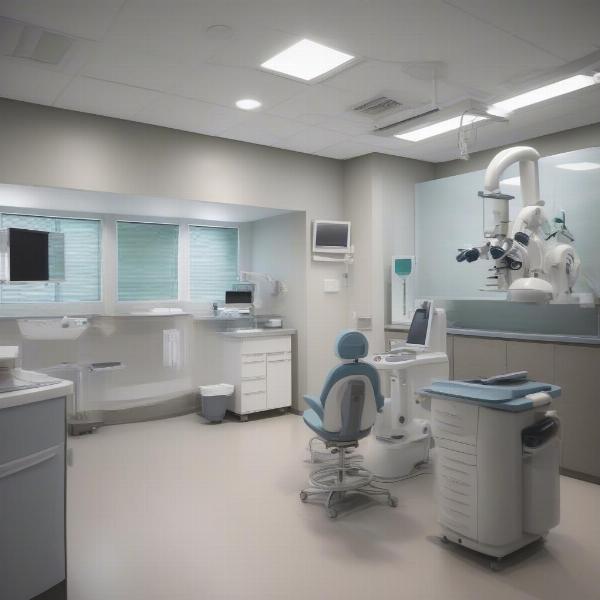When your furry friend is experiencing eye problems, finding the right dog eye specialist is crucial. Understanding the qualifications, what to expect during a visit, and how to choose the best specialist for your dog’s needs can be overwhelming. This guide will provide you with all the necessary information to make an informed decision and ensure your dog receives the best possible eye care.
What is a Dog Eye Specialist?
A dog eye specialist, also known as a veterinary ophthalmologist, is a veterinarian who has completed advanced training and certification specifically in the diagnosis and treatment of eye diseases in animals. They possess in-depth knowledge of the complex anatomy and physiology of the eye, allowing them to diagnose and manage a wide range of ocular conditions. These specialists are equipped to perform intricate surgical procedures and prescribe specialized medications for eye-related ailments.
When Should You See a Dog Eye Specialist?
Knowing when to seek specialized care for your dog’s eyes is important. If you notice any of the following symptoms, it’s time to schedule an appointment with a dog eye specialist:
- Excessive tearing or discharge
- Redness or swelling of the eyes
- Cloudiness or change in eye color
- Squinting or pawing at the eyes
- Sensitivity to light
- Visible changes in the eye’s structure
How to Choose a Dog Eye Specialist
Choosing the right dog eye specialist requires careful consideration. Here are some key factors to consider:
- Board Certification: Look for a diplomate of the American College of Veterinary Ophthalmologists (ACVO). This certification signifies that the specialist has undergone rigorous training and examination.
- Experience and Expertise: Inquire about the specialist’s experience with specific eye conditions your dog may have.
- Recommendations: Ask your regular veterinarian for recommendations or seek referrals from other dog owners.
- Facility and Equipment: Ensure the specialist’s facility is well-equipped with advanced diagnostic and surgical tools.
- Communication and Comfort: Choose a specialist who communicates clearly and makes you and your dog feel comfortable.
 Modern veterinary ophthalmology clinic
Modern veterinary ophthalmology clinic
What to Expect During a Visit to the Dog Eye Specialist
A typical visit to a dog eye specialist involves a comprehensive eye examination, including:
- Medical History Review: The specialist will review your dog’s overall medical history and any previous eye problems.
- Visual Acuity Test: To assess your dog’s vision.
- Slit-Lamp Biomicroscopy: To examine the internal structures of the eye.
- Tonometry: To measure the pressure inside the eye.
- Ophthalmoscopy: To examine the back of the eye, including the retina and optic nerve.
Common Eye Conditions Treated by Dog Eye Specialists
Dog eye specialists treat a wide range of eye conditions, including:
- Cataracts
- Glaucoma
- Dry Eye (Keratoconjunctivitis Sicca)
- Corneal Ulcers
- Cherry Eye
- Progressive Retinal Atrophy (PRA)
- Uveitis
Conclusion
Finding the right dog eye specialist is essential for protecting your dog’s vision. By understanding the qualifications, the examination process, and what to look for in a specialist, you can ensure your furry friend receives the best possible eye care. Early diagnosis and treatment are crucial for many eye conditions, so don’t hesitate to seek specialized care if you notice any changes in your dog’s eyes.
FAQs
- How much does a visit to a dog eye specialist cost? The cost can vary depending on the location and the specific services provided. It’s best to contact the specialist’s office for an estimate.
- Is anesthesia required for all eye procedures? Not all procedures require general anesthesia. Some examinations and minor procedures can be performed with topical anesthetic drops.
- How can I prevent eye problems in my dog? Regular veterinary checkups, proper grooming around the eyes, and a healthy diet can contribute to maintaining your dog’s eye health.
- Are certain dog breeds more prone to eye problems? Yes, some breeds are genetically predisposed to certain eye conditions. Discuss your dog’s breed with your veterinarian to understand potential risks.
- What are the signs of an eye emergency? Sudden blindness, severe pain, profuse bleeding, or protrusion of the eyeball are signs of an eye emergency that require immediate veterinary attention.
Related Articles
ILM Dog is your global resource for expert advice on dog care and breeding. We offer comprehensive information on various aspects of dog ownership, from breed selection and health care to training, nutrition, grooming, and accessories. Our focus is on providing practical, reliable advice for both new and experienced dog owners across diverse cultures. Whether you’re looking for guidance on choosing the right breed, understanding your dog’s health needs, or finding the perfect products, ILM Dog is here to help. Contact us at [email protected] or +44 20-3965-8624 for personalized assistance. We are committed to empowering dog owners worldwide with the knowledge and resources they need to provide their beloved companions with a happy and healthy life. Visit ILM Dog today to learn more.